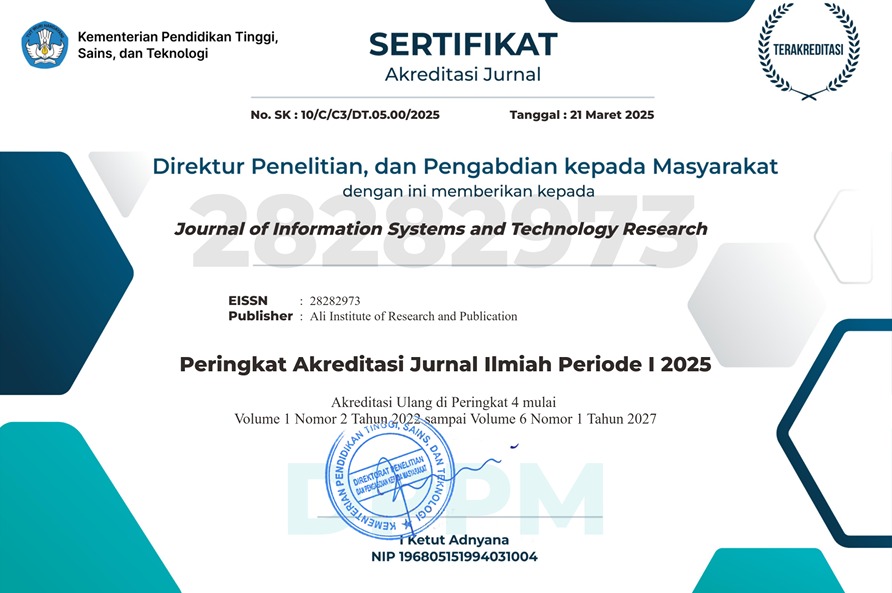Innovative Integration of Computer Network Technology in Modern Educational Systems
DOI:
https://doi.org/10.55537/jistr.v3i3.902Keywords:
Artificial Intelligence (AI), Autonomous Learning Platform, Interactive Network Intelligent Education, RBF Algorithm, Teaching EfficiencyAbstract
A novel educational system has been developed using the Radial Basis Function (RBF) algorithm to address the limitations of traditional classroom environments, which often rely on standardized material and fixed teaching methods. This research assesses recent advancements in interactive intelligent education systems by combining Artificial Intelligence (AI) with interactive teaching methods. A model based on cognitive functions is constructed using the RBF algorithm to personalize instructional approaches and foster a self-directed learning platform. The research methodology involves a comprehensive literature review, developing an Education Intelligent System (EIS) using AI-driven cognitive modelling, and the implementation of the RBF algorithm within a neural network architecture. The system's effectiveness is evaluated through empirical methods, including extensive data analysis and continuous refinement based on student performance feedback. Additionally, a network topology model is designed to enhance the system's adaptability for different roles within the educational framework. The results show significant improvements in instructional effectiveness, learner engagement, and personalized learning experiences. This research demonstrates that AI and interactive technologies can revolutionize conventional educational methods, enhance learner proficiency, and cultivate a more dynamic and engaging learning environment. Future work aims to improve the system's user interface and analyze larger datasets to refine the AI algorithms further.
Downloads
References
Alam, A. (2022). Employing adaptive learning and intelligent tutoring robots for virtual classrooms and smart campuses: reforming education in the age of artificial intelligence. In Advanced Computing and Intelligent Technologies: Proceedings of ICACIT 2022 (pp. 395-406). Springer Nature Singapore. https://doi.org/10.1007/978-981-19-2980-9_32
Babitha, M. M., Sushma, C., & Gudivada, V. K. (2022). Trends of Artificial Intelligence for online exams in education. International Journal of Early Childhood Special Education, 14(01), 2457-2463. https://doi.org/10.9756/INT-JECSE/V14I1.290
Chaudhry, M., & Kazim, E. (2021). Artificial Intelligence in Education (AIED): A high-level academic and industry note. SSRN. https://doi.org/10.2139/ssrn.3833583
Chen, X., Zou, D., Xie, H., Cheng, G., & Liu, C. (2022). Two decades of artificial intelligence in education: Contributors, collaborators, research topics, challenges, and future directions. Educational Technology & Society, 25(1), 28-47. https://www.jstor.org/stable/48647028
Chen, S., & Wang, J. (2023). Virtual Reality Human–Computer Interactive English Education Experience System Based on Mobile Terminal. International Journal of Human–Computer Interaction, 1-10. https://doi.org/10.1080/10447318.2023.2190674
Dong, M. (2022). Application of Voice Database in Enterprise Human Resources Optimization Based on Improved Algorithm. Mobile Information Systems, 2022, 1-10. https://doi.org/10.1155/2022/4816516
Haderer, B., & Ciolacu, M. (2022). Education 4.0: Artificial intelligence assisted task-and time planning system. Procedia Computer Science, 200, 1328-1337. https://doi.org/10.1016/j.procs.2022.01.334
Holmes, W., & Porayska-Pomsta, K. (Eds.). (2022). The Ethics of Artificial Intelligence in education: Practices, challenges, and debates. Taylor & Francis. https://doi.org/10.4324/9780429329067
Khosravi, H., Shum, S. B., Chen, G., Conati, C., Tsai, Y.-S., Kay, J., Knight, S., Martinez-Maldonado, R., Sadiq, S., & Gašević, D. (2022). Explainable Artificial Intelligence in education. Computers and Education: Artificial Intelligence, 3, 100074. https://doi.org/10.1016/j.caeai.2022.100074
Limna, P., Jakwatanatham, S., Siripipattanakul, S., Kaewpuang, P., & Sriboonruang, P. (2022). A Review of Artificial Intelligence (AI) in Education during the Digital Era. Advance Knowledge for Executives, 1(1), 1-9. SSRN. https://doi.org/10.2139/ssrn.4160798
Ouyang, F., Zheng, L., & Jiao, P. (2022). Artificial intelligence in online higher education: A systematic review of empirical research from 2011 to 2020. Education and Information Technologies, 27(6), 7893-7925. https://doi.org/10.1007/s10639-022-10925-9
Peramunugamage, A., Ratnayake, U. W., & Karunanayaka, S. P. (2023). Systematic review on mobile collaborative learning for engineering education. Journal of Computers in Education, 10(1), 83-106. https://doi.org/10.1007/s40692-022-00223-1
Siddiqui, S. T., Ahmad, M. O., Siddiqui, A., Khan, H., Khan, M. R., & Alsabhan, A. H. (2022, December). IoT Edge and Fog Computing Architecture for Educational Systems in Universities. In 2022 IEEE International Conference on Current Development in Engineering and Technology (CCET) (pp. 1-6). IEEE. https://doi.org/10.1109/CCET56606.2022.10079946
Shaikh, A. A., Kumar, A., Jani, K., Mitra, S., García-Tadeo, D. A., & Devarajan, A. (2022). The Role of Machine Learning and Artificial Intelligence for making a Digital Classroom and its sustainable Impact on Education during COVID-19. Materials Today: Proceedings, 56, 3211-3215. https://doi.org/10.1016/j.matpr.2021.09.368
Su, J., & Yang, W. (2022). Artificial intelligence in early childhood education: A scoping review. Computers and Education: Artificial Intelligence, 3, 100049. https://doi.org/10.1016/j.caeai.2022.100049
Thurzo, A., Strunga, M., Urban, R., Surovková, J., & Afrashtehfar, K. I. (2023). Impact of Artificial Intelligence on Dental Education: A Review and Guide for Curriculum Update. Education Sciences, 13(2), 150. https://doi.org/10.3390/educsci13020150
Xu, W., & Ouyang, F. (2022). A systematic review of AI role in the educational system based on a proposed conceptual framework. Education and Information Technologies, 27(3), 4195-4223. https://doi.org/10.1007/s10639-021-10774-y
Yang, W. (2022). Artificial Intelligence education for young children: Why, what, and how in curriculum design and implementation. Computers and Education: Artificial Intelligence, 3, 100061. https://doi.org/10.1016/j.caeai.2022.100061
Downloads
Published
How to Cite
Issue
Section
License
Copyright (c) 2024 Zohaib Hassan Sain, Henry H Loupias, Rini Ayu Susanti, Razvan Serban, Chanda Chansa Thelma

This work is licensed under a Creative Commons Attribution-ShareAlike 4.0 International License.







